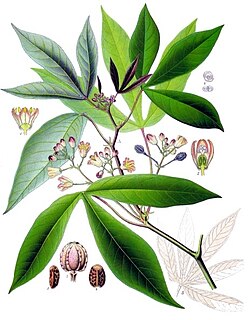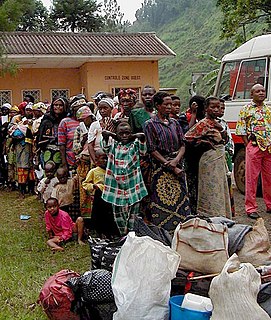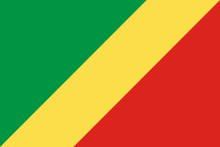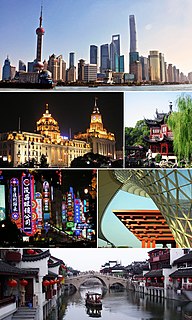
Congo may refer to either of two countries that border the Congo River in central Africa:

Katanga was one of the eleven provinces of the Democratic Republic of the Congo between 1966 and 2015, when it was split into the Tanganyika, Haut-Lomami, Lualaba and Haut-Katanga provinces. Between 1971 and 1997, its official name was Shaba Province.

The Niger–Congo languages are the world's largest language families and Africa's largest in terms of geographical area, number of speakers, and number of distinct languages. It is generally considered to be the world's largest language family in terms of distinct languages, ahead of Austronesian, although this is complicated by the ambiguity about what constitutes a distinct language; the number of named Niger–Congo languages listed by Ethnologue is 1,540.

The economy of the Republic of the Congo is a mixture of subsistence hunting and agriculture, an industrial sector based largely on petroleum extraction and support services, and a government spending, characterized by budget problems and overstaffing. Petroleum has supplanted forestry as the mainstay of the economy, providing a major share of government revenues and exports. Nowadays the country is increasingly converting natural gas to electricity rather than burning it, greatly improving energy prospects.

The Congo River, formerly known as the Zaire River under the Mobutu regime, is the second longest river in Africa, shorter only than the Nile, as well as the second largest river in the world by discharge volume, following only the Amazon. It is also the world's deepest recorded river, with measured depths in excess of 220 m (720 ft). The Congo-Lualaba-Chambeshi River system has an overall length of 4,700 km (2,920 mi), which makes it the world's ninth-longest river. The Chambeshi is a tributary of the Lualaba River, and Lualaba is the name of the Congo River upstream of Boyoma Falls, extending for 1,800 km (1,120 mi).

Kinshasa (; French: [kinʃasa]; formerly Léopoldville is the capital and the largest city of the Democratic Republic of the Congo. The city is situated alongside the Congo River.

Leopold II was King of the Belgians from 1865 to 1909. Born in Brussels as the second but eldest surviving son of Leopold I and Louise of Orléans, he succeeded his father to the Belgian throne in 1865 and reigned for 44 years until his death – the longest reign of any Belgian monarch. He died without surviving male heirs. The current Belgian king descends from his nephew and successor, Albert I.

The Belgian Congo was a Belgian colony in Central Africa from 1908 until independence in 1960. The former colony adopted its present-day name, the Democratic Republic of the Congo (DRC), in 1964.

The Democratic Republic of the Congo, also known as DR Congo, the DRC, DROC, Congo-Kinshasa, or simply the Congo, is a country located in Central Africa. It is sometimes anachronistically referred to by its former name of Zaire, which was its official name between 1971 and 1997. It is, by area, the largest country in sub-Saharan Africa, the second-largest in all of Africa, and the 11th-largest in the world. With a population of over 78 million, the Democratic Republic of the Congo is the most populous officially Francophone country, the fourth-most-populous country in Africa, and the 16th-most-populous country in the world. Eastern DR Congo has been the scene of ongoing military conflict in Kivu, since 2015.

The French Congo or Middle Congo was a French colony which at one time comprised the present-day area of the Republic of the Congo, Gabon, and the Central African Republic.

Joseph Kabila Kabange is a Congolese politician who served as President of the Democratic Republic of the Congo between January 2001 and January 2019. He took office ten days after the assassination of his father, President Laurent-Désiré Kabila. He was elected as President in 2006 and re-elected in 2011 for a second term. Since stepping down after the 2018 election, Kabila, as a former president, will be a senator for life, according to the Constitution of the DRC.

The Second Congo War began in the Democratic Republic of the Congo in August 1998, little more than a year after the First Congo War, and involved some of the same issues. The war officially ended in July 2003, when the Transitional Government of the Democratic Republic of the Congo took power. Although a peace agreement was signed in 2002, violence has continued in many regions of the country, especially in the east. Hostilities have continued since the ongoing Lord's Resistance Army insurgency, and the Kivu and Ituri conflicts.
The Congo national football team, nicknamed the Diables Rouges , is the national team of the Republic of the Congo and is run by the Congolese Football Federation. They have never qualified for the World Cup, but did win the Africa Cup of Nations in 1972. They also won the All-Africa Games football tournament in 1965.

There are currently twenty-five provinces in the Democratic Republic of the Congo. The capital, Kinshasa city, is administratively equivalent to a province.

The Democratic Republic of the Congo is a multilingual country where an estimated total of 242 languages are spoken. Ethnologue lists 215 living languages. The official language, inherited from the colonial period, is French. Four indigenous languages have the status of national language: Kituba, Lingala, Swahili and Tshiluba.

The Mining industry of the Democratic Republic of the Congo is a significant factor in the world's production of cobalt, copper, diamond, tantalum, tin, and gold. It is the Democratic Republic of the Congo's largest source of export income. In 2009, the Democratic Republic of the Congo (DRC) had an estimated $24 trillion in untapped mineral deposits, including the world's largest reserves of coltan and significant quantities of the world's cobalt. The United States Geological Survey estimates that the DRC has 1 million tons of lithium resources.

The Kivu conflict began in 2004 in the eastern Congo as an armed conflict between the military of the Democratic Republic of the Congo (FARDC) and the Hutu Power group Democratic Forces for the Liberation of Rwanda (FDLR) in the Democratic Republic of the Congo. It has broadly consisted of three phases, the third of which is an ongoing conflict. Prior to March 2009, the main combatant group against the FARDC was the National Congress for the Defence of the People (CNDP). Following the cessation of hostilities between these two forces, rebel Tutsi forces, formerly under the command of Laurent Nkunda, became the dominant opposition to the government forces.
The Ubangian languages form a fairly close-knit language family of some seventy languages centered on the Central African Republic. They are the predominant languages of the CAR, spoken by 2–3 million people, and include the national language, Sango.
Miss Earth Republic of the Congo is the official title given to the Republic of the Congo's delegate to the Miss Earth pageant. The reigning titleholders dedicate their year to promote environmental projects and to address issues concerning the environment.


















